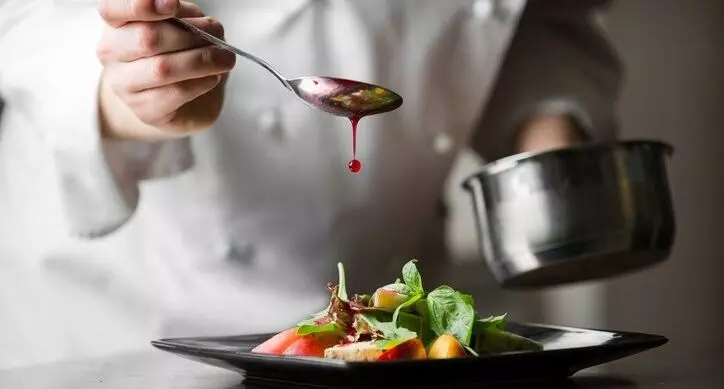Cooking up a career
If you are passionate about food, then it can lead to a fulfilling career in the culinary world

Celebrity Indian chef Ranveer Brar, from Lucknow, fell in love with cooking at 13. Exploring Lucknow’s diverse cuisines, he was captivated by people’s passion for food, inspiring his decision to become a chef. His parents initially opposed his choice, worried about reputation and job security. Undeterred, Brar left home at 17 to learn from Muneer Ustad, a skilled kebab chef in Lucknow. Later, he joined the Institute of Hotel Management in Lucknow for formal training. At 25, Brar became the youngest executive chef in an Indian five-star hotel, marking the start of his successful culinary career.
Culinary art is a rapidly evolving form of art that’s reshaping the food industry. Culinary artists are driven by their love for food and cooking. Mastering their craft involves practicing, understanding ingredients, flavours, and raw materials, and having the creativity to innovate in the world of culinary arts. Nevertheless, formal education plays a crucial role in mastering the art of handling food, especially in terms of presentation.
“A culinary science degree prepares individuals for a diverse range of culinary career paths. There is a growing need for skilled chefs and culinary entrepreneurs. Just as hospitality education has broader applications and societal implications, culinary science graduates also contribute to the broader culinary industry, applying their knowledge and skills in various roles. Our culinary programmes are offered in partnership with École Ducasse, France, and our hospitality programmes are taught in alliance with Les Roches, Switzerland. We also provide students with a global education and the opportunity to learn from renowned academicians, industry experts, and researchers,” said Kunal Vasudeva, Co-founder and Managing Director of the Indian School of Hospitality (ISH).
For those interested in BSc Culinary Arts, Advanced Diploma in Culinary Arts, or Diploma in Culinary Arts, can enroll at the International Institute of Culinary Arts and Career Management in Pune. The Culinary Academy of India in Hyderabad is known as one of India’s top institutes for culinary arts and catering technology. They offer a Bachelor’s Degree in Catering Technology and Culinary Arts, Advanced Diploma in Culinary Arts, along with shorter courses like a one-and-a-half-year certificate course in food production and patisserie, and a six-month diploma in Indian and continental kitchen. Indian Culinary Institute (ICI) in Noida is an autonomous institute under Ministry of Tourism, Government of India where one can study BBA in Culinary Arts and MBA in Culinary Arts. The two-year MBA programme equips students with all the required skills, knowledge and attitude to efficiently discharge responsibilities in the culinary sector as chef/ kitchen management and culinary specialist. The programme also involves in-depth laboratory/ kitchen work for students to acquire required knowledge and skill standards in the operational areas of food production, food handling, hygiene and food safety standards. It also provides managerial inputs for kitchen management and food entrepreneurship. Studying culinary arts in India can cost between Rs 30,000 to Rs 4,80,000 per year. The best colleges offer placements with average salaries ranging from Rs 2.25 LPA to Rs 17.16 LPA.
For those aspiring to study abroad, popular choices include the Auguste Escoffier School of Culinary Arts in the USA, Culinary Arts Academy in Switzerland, Le Cordon Bleu in Paris, and the Institute of Culinary Education in New York.
Meanwhile, not every culinary school graduate aims to work in a restaurant. The culinary world offers various career paths, including roles like sous chef, executive chef, recipe developer, food stylist, chocolatier, pastry chef, restaurant manager, wine sommelier, nutritionist, food technologist, and wedding cake designer. There are diverse opportunities beyond traditional kitchen roles in the culinary world.
“Offbeat career options such as sommeliers have gained popularity in recent years. These offbeat careers offer unique opportunities for students to pursue their passions and explore niche areas within the vast hospitality and tourism industry, catering to the specialised interests and preferences of travellers,” said Dr Shefali Joshi, Head, Department of Hospitality Management, MIT-WPU.
Though the iconic Tarla Dalal was India’s first home chef, the Covid-19 pandemic boosted the home chef market, and social media remains the main way people discover these businesses. Take for example Sharmila Basu Thakur, who was a professor of philosophy and lifestyle journalist in Kolkata before becoming a home chef with pop up Food Farista. “I have been interested in dance, cooking, travel and fashion since my teenage years. After my retirement as a journalist, I knew I had to follow my passions. In fact, I believe every person irrespective of gender should pursue their passions and stay true to themselves,” she said.
Being a qualified culinary professional opens doors to travel, connect with global chefs, and build a global career. However, jobs in the culinary world involve challenges like long hours and demanding physical work too.
In an interview, Brar had said how celebrity chefs like Sanjiv Kapoor, Vikas Khanna, and Kunal Kapur are end products of a long process. He also mentioned how people get obsessed with the packaging, but they don’t realise that the journey started somewhere and then it got here.



